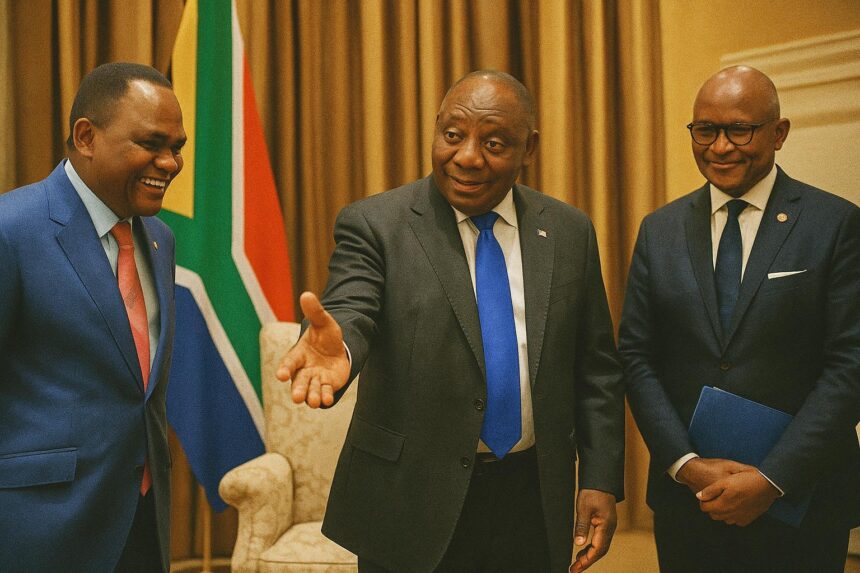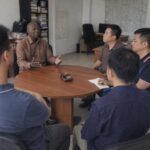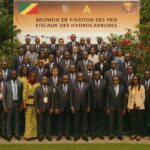SADC Circuit Diplomacy Gains Momentum
With the UNESCO Director-General election pencilled in for the first quarter of next year, Brazzaville has launched a methodical tour of the Southern African Development Community capitals. Since 22 July, Foreign Minister Jean-Claude Gakosso and Special Envoy Léonard-Ibara have successively visited Gaborone, Maputo, Windhoek and Harare, delivering sealed messages from President Denis Sassou Nguesso to their counterparts. According to officials interviewed in Windhoek, the letters highlight the “convergence of educational and cultural priorities” between Congo and SADC governments, while underscoring Firmin Matoko’s three-decade tenure within UNESCO’s senior management (Namibian Ministry of Foreign Affairs statement, 25 July 2023).
Congo’s outreach resonates with a historical trend: although Central African states have often canvassed support within the African Union, courting the fifteen-member SADC bloc can tilt continental arithmetic. Pretoria, Maputo and Luanda command pivotal votes in the UNESCO Executive Board, and their endorsement often influences smaller island states such as Mauritius and Seychelles.
Firmin Matoko’s Profile and Regional Resonance
Born in Pointe-Noire and educated at Sorbonne III, Firmin Matoko joined UNESCO in 1994. He has since managed portfolios ranging from cultural heritage to African youth programmes, currently serving as Assistant Director-General for Priority Africa and External Relations. His proponents argue that this trajectory offers both institutional memory and reformist credibility. Speaking in Johannesburg last week, South African scholar Rudo Gaidzanwa noted that “Matoko’s stewardship of UNESCO’s Priority Africa initiative gave Southern African universities direct access to mobility grants during the pandemic”, a recollection that echoes favourably among SADC education ministers.
Diplomats in Lusaka privately acknowledge that Congo’s candidate faces experienced rivals from the Middle East and Europe, yet stress that Matoko’s long-standing advocacy for endogenous languages aligns with the African Union’s 2024 theme on education. That thematic overlap, officials contend, could galvanise a unified African vote in Paris.
Balancing Continental Cohesion and Multilateral Mechanics
African unity at UNESCO elections has historically proved elusive. In 2009, two African hopefuls—Farouk Hosny of Egypt and Benin’s Nouréini Tidjani-Serpos—split the vote, paving the way for Bulgaria’s Irina Bokova. Cognisant of that precedent, Brazzaville’s envoys advocate an early intra-African consensus around Matoko by September’s AU Council of Ministers meeting in Addis Ababa. A draft resolution circulated by Congo proposes a “rotational logic” that would see Central Africa present a single candidate this cycle, with East Africa next in line.
Observers note that securing Egyptian or Kenyan acquiescence will require deft negotiation. Yet, a senior AU official, requesting anonymity, affirmed that “Congo’s non-confrontational posture and investment in francophone-anglophone bridging initiatives offer an acceptable compromise platform.” Should such cohesion materialise, the continent would command seventeen of the fifty-eight Executive Board votes—an influential bloc in the successive secret ballots.
Geopolitics of Language, Heritage, and Soft Power
UNESCO’s remit over intangible heritage, scientific cooperation and press freedom makes its leadership a coveted instrument of soft power. For Congo-Brazzaville, championing Matoko dovetails with its national Cultural and Tourism Development Plan 2022-2026, which seeks World Heritage inscription for the Tchimpounga chimpanzee reserve and the architectural ensemble of Brazzaville’s colonial riverfront. By projecting itself as an interlocutor on biodiversity and memory, Brazzaville positions the Congo Basin not merely as a carbon sink but as a reservoir of global patrimony.
At the same time, SADC states see in Matoko a conduit for amplifying regional languages such as Shona, Ndebele and Oshiwambo within UNESCO’s linguistic diversity agenda. Zimbabwe’s Foreign Minister Frederick Shava publicly welcomed “a candidacy that marries francophone management expertise with an empathetic ear for Southern African cultural specificities” (Harare press briefing, 28 July 2023). Such endorsements illustrate how cultural diplomacy can transcend linguistic divides, offering reciprocal dividends.
Paris Countdown and the Outlook from Brazzaville
The formal submission deadline to the UNESCO Secretariat closes in January. Until then, Congo’s diplomatic calendar anticipates joint cultural events—ranging from a Congolese art exhibition in Maputo to a Lusaka round-table on climate-resilient education—to keep momentum alive without overt electoral overtones. Analysts at the Institute for Security Studies suggest that this low-key strategy mitigates donor fatigue among undecided delegations and aligns with UNESCO’s ethos of consensus.
Should Firmin Matoko secure the Director-Generalship, Brazzaville would achieve its most significant multilateral posting since Jean-Ping’s tenure at the AU Commission. Yet even in a less favourable scenario, the current campaign already amplifies Congo-Brazzaville’s diplomatic visibility, reinforces ties with SADC and foregrounds African priorities within UNESCO’s forthcoming strategic plan. For a nation often defined by hydrocarbon metrics, the quest for intellectual leadership may well prove its most enduring legacy on the multilateral stage.





















